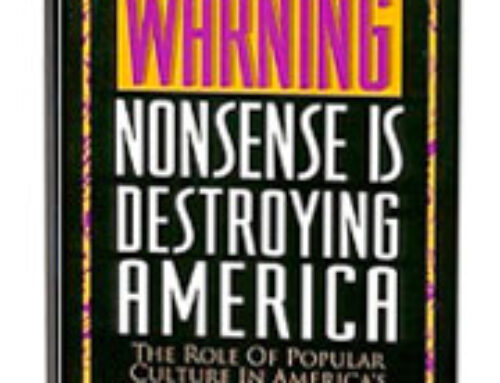 In a recent essay titled “Our Urgent Need to Examine Ideas” I noted that in this age of constant, rapid, and unsolicited information, many ideas slip into our minds unexamined. Yet we tend to defend those uninvited ideas as conscientiously as we do ones we have produced through careful thought. I explained that there is no easy way to identify these vagrant ideas after they have taken up residence in our minds. The best we can do is restore the curiosity we had as children, which for most adults has significantly diminished, and begin asking pertinent questions of our own ideas, as well as the ideas of other people. I recommended Albert Einstein’s perspective: “I have no special talents. I am only passionately curious . . . The important thing is not to stop questioning.” (Emphasis added) This essay expands on the importance of such curiosity.
In a recent essay titled “Our Urgent Need to Examine Ideas” I noted that in this age of constant, rapid, and unsolicited information, many ideas slip into our minds unexamined. Yet we tend to defend those uninvited ideas as conscientiously as we do ones we have produced through careful thought. I explained that there is no easy way to identify these vagrant ideas after they have taken up residence in our minds. The best we can do is restore the curiosity we had as children, which for most adults has significantly diminished, and begin asking pertinent questions of our own ideas, as well as the ideas of other people. I recommended Albert Einstein’s perspective: “I have no special talents. I am only passionately curious . . . The important thing is not to stop questioning.” (Emphasis added) This essay expands on the importance of such curiosity.
Curiosity may be applied in either of two directions: forward in time, asking what could happen in the future if a present idea or proposal were put into practice? Or backward in time, asking what in the past could have caused what happened subsequently? Whether the application of curiosity is forward or backward, its path of inquiry can be complex, tracing a series of developments, one causative factor producing an effect that in turn causes another effect, and so on over months, years, or for that matter centuries or millennia.
To illustrate how curiosity provides insight, let’s consider a broad range of sociological failures that perplex most Americans today: the failure of American government agencies to carry out their functions sensibly, the failure of educational institutions to provide meaningful learning, the failure of communications media to provide truthful information to the public, and the failure of families to inculcate moral values and a sense of responsibility in their offspring.
Curiosity moves us from mere perplexity about these developments to an understanding of their root causes.
Of special significance in this inquiry are three interlocking developments that occurred in the 1950s/1960s: 1) Alfred Kinsey’s claims that all forms of sexuality are “normal” and that children are sexual from birth and unharmed by sexual experiences with adults. 2) Carl Rogers’ claims that feelings are more dependable than reasoning, and that truth is not objective (that is, discovered by searching) but instead subjective, created by each individual to his/her satisfaction. 3) Abraham Maslow’s claim that high self-esteem is necessary for achievement of any kind to occur.
Next, curiosity helps us identify how these developments, individually and in combination, have impacted American culture.
The claims of these three individuals were widely publicized as scientific insights that disproved a host of traditional beliefs. Notable among those beliefs were religious and ethical teachings on sexual behavior, philosophical and educational emphases on the pursuit of truth as the basis of learning, the journalistic distinction between fact and opinion, and the parental guidance of children toward self-improvement. The questioning of these traditional beliefs led many people to first dismiss them as no longer valid and then to abandon them.
These changes took decades to complete. The new views first had to permeate individual minds and alter deeply rooted beliefs and behaviors. Resistance to change had to give way to tolerance, then acceptance, and finally championing of the new ideas. Parents and teachers had to internalize the new views and incorporate them in their teaching. Religious leaders had to make biblical lessons compatible with the new perspectives. Young people had to absorb the views and apply them in their lives. And several generations had to become alienated from the traditional beliefs and principles that made life safe and sane.
The more advanced the dismissal and abandonment of traditional beliefs became, the greater the intellectual vacuum that resulted. In recent decades that vacuum has been filled by increasingly absurd ideas and social initiatives. Here are a few examples of those ideas and initiatives:
The idea that child/adult sex is wholesome has encouraged pedophilia. The substitution of emotion for reason has led elected officials to classify shoplifting as a human right, defund police departments, release dangerous criminals from prison, open the border to millions of migrants, and legally formalize the notion that gender is a matter of feeling rather than biological fact. The same abandonment of reason has led teachers to allow second graders to change genders without informing their parents. And the notion that low self-esteem thwarts achievement has frightened parents from setting behavioral requirements for their children and educators from setting academic standards for their students.
These and similar absurdities have produced social and cultural chaos. Adding to that chaos is the blindness of a substantial number of America’s leaders to the fact that the ideas that began the process of America’s decline were and remain grossly mistaken. To make matters immeasurably worse, many of those leaders believe the mistaken ideas must be perpetuated and that Americans must be persuaded or, if necessary, forced to accept them. Those leaders consist not only of politicians, but also of educators, religious leaders, media moguls, and corporate executives, a truly formidable force.
What are the chances that millions of Americans who have little or no knowledge of their country’s philosophical and religious traditions, yet experience constant propagandizing against those traditions, will return to them without a vigorous effort and a sensible strategy? The answer is slim to none. That is why I have argued for the restoration of the curiosity we had as children, which means asking pertinent questions about ideas, and not just the ideas being promoted by the champions of absurdity, but also our own ideas, many of which we have simply absorbed rather than thoughtfully examined.
In short, the surest, and perhaps the only real hope of restoring sanity and wisdom to our culture is for great numbers of Americans to practice with diligence the behavior recommended by Albert Einstein a century ago: to be “passionately curious” and never stop questioning.
Copyright © 2023 by Vincent Ryan Ruggiero. All rights reserved.

